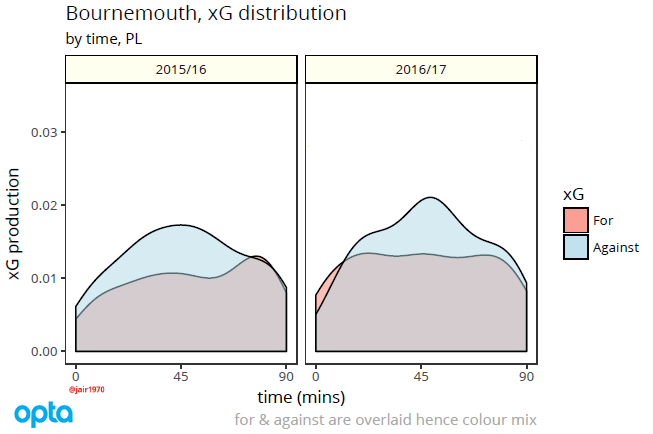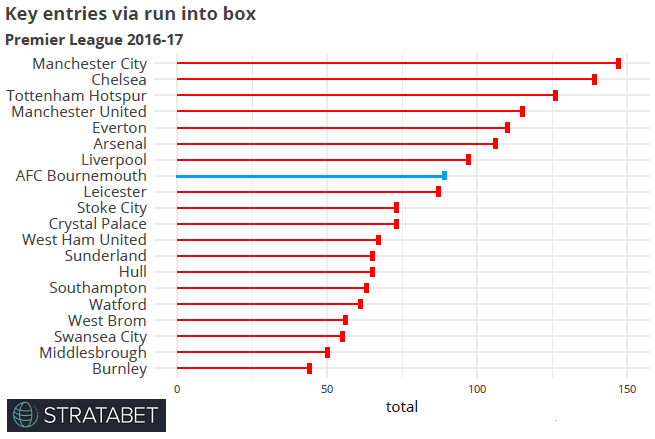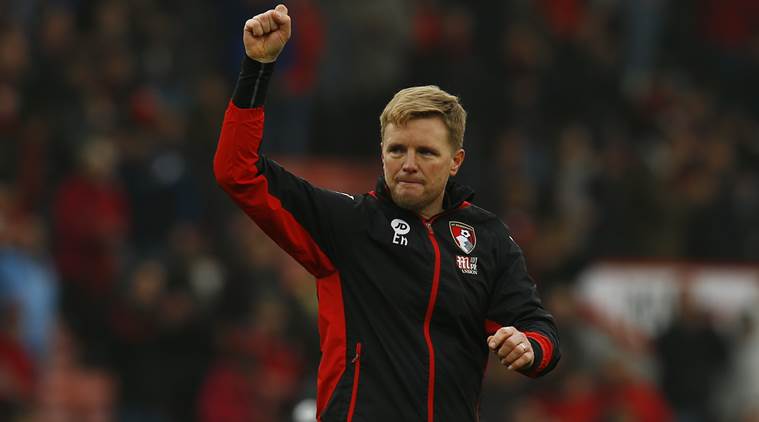In May 2015 Bournemouth clinched top spot in the Championship and achieved promotion to England's top division for the first time in the club’s history. When that happened there was much fanfare (deserved, of course), yet a few matches into 2015/16 season the novelty appeared to wear off a little and they haven’t received a great deal of coverage since. This despite having achieved safety from relegation twice in a row. It’s a shame really because a deeper look at them reveals some interesting tidbits and lessons to learn.
Their first season in the Premier League was shaky in the extreme. They finished 16th and five points above the relegation spots, yet had a worse goal difference (-22) than the two teams below them (Sunderland and the relegated Newcastle). Their non-pen expected goal difference however was -11.4.
This disparity stems from a defence with a tendency to collapse. Despite having a non-pen xGA of 48.4 they ended up actually conceding 63 goals. Parts of this may well be variance, but we have to also consider that goals were possibly easier to score against them than a team with a more defensive focus. They conceded 3 or more goals in 11 matches. Of those 11 only 5 were against teams who finished in the PL’s top 6, so this wasn’t a case of just getting bullied by the big boys.
Cut to the end of the 2016/17 season and they finished 9th with an improved goal difference of -12. So they sorted out that defence then? Well, no. In fact, it got even worse. They conceded 60 non-penalty goals and again conceded 3 or more goals in 11 matches. But this time with an expected goals against of 57.2. They gave up more shots (11.6 in 15/16 vs 14.5 in 16/17) and those shots were also closer to goal on average (17.7 metres in 16/17 vs 18.3 metres in 15/16).
There’s also little to suggest they’re getting defenders in front of shots and fooling expected goals models in a Burnley-esque style. Stratagem data for 2016/17 shows that they had 2 to 4 players in front of the shot 72% of the time and 5+ players in front of it 13.7% of the time, both numbers being bang in line with the league average.
The improvement they did make, such as it is, lay in the attack. Last season they posted an iffy non-pen 36.9 expected goals for tally. This season that has moved forward to 43.0 xGF, a number more befitting a midtable finish.

Despite this improvement, however, open play is not where Bournemouth’s bread is buttered. They scored 7 penalties in 16/17, joint-first in the PL alongside teams you’d perhaps ‘expect’ to be there: Tottenham, Liverpool and Man City. It could have been even more as their 10 penalties won overall was the best in the league.
This is an interesting quirk to Howe’s Bournemouth. It appeared absent in 15/16 when they only won 4 penalties, but if you look back to their time in the Championship it becomes clear it is a point of emphasis. In 2014/15 when they achieved promotion and the Championship title they won a staggering 16 penalties, a full 7(!) more than the team who won the 2nd most.
This could well be a result (intended or otherwise) of Bournemouth’s playing style. Per Stratagem data, they were 8th in the league in key entries into the box via a run this last season:

The seven teams that were ahead of them are the league's actual top seven, so in this regard Bournemouth are the best of the rest. The evidence points towards Howe telling his players to put their heads down and run when near the opposition box, and to some degree it’s working. Something he should be given praise for as most teams are dying for anything similar that separates them from the morass. Whether it’s a sustainable edge is another question entirely. One that depends on how thoroughly their opponents are scouting them and whether their coaching staff can drill it into them to just not foul.
Transfer business needs to be addressed because it’s been a bit of a bumpy ride in that department. There has been a degree of success. Benik Afobe, Josh King and Nathan Aké on loan were all agreeable moves. Problem is these bright spots have been in the margins of a wider, more confusing transfer picture.
Jordon Ibe - a player who, with the best will in the world, didn’t even flash much talent at Liverpool - was brought in for £15m. Even if he did turn out to be the absolute bee's knees Bournemouth were rumoured to have very generously offered Liverpool a buy-back clause, all but dooming the deal to be an overpaid loan at best and a complete waste at worst (Ibe played a shade over 1000 minutes in 2016/17, registering no goals or assists).
This week, as you’ve no doubt heard, they picked up Jermaine Defoe on a three-year deal from newly relegated Sunderland. There’s plenty of reason to believe that Defoe isn’t all he’s cracked up to be but let’s put that to side for a moment and assume for the sake of argument that the conventional wisdom (‘he gets you goals’) is correct on him. He’s 34-years-old, turning 35 in October yet has been signed up on a three-year deal.
Josh King alone scored 16 for Bournemouth in 16/17 as a primary option, not to mention Afobe and Callum Wilson’s contributions. Defoe had a whole team built around him last season and notched 15 goals, 5 of those being penalties (Is that it? Did they bring him in to take all these penalties they’re winning? He certainly didn't win any penalties himself last year). There's no case for him as a creation option either: Last season Defoe produced fewer key passes (20) in 3323 minutes than Afobe produced in 1454 minutes (23).
(While we're here: Bournemouth were dead last in terms of regaining the ball past their opposition's 18-yard-line via a turnover this season, and by a large margin too. Having a 35-year-old up front doing the pressuring will not help with generating those sorts of opportunities.)
Then you have all these players hanging around the squad seemingly without much purpose like Lys Mousset or Max Gradel. Howe has been loyal to his starting group of players, but left others apparently marginalised. Not to mention the strange Jack Wilshere experiment. It’s very hard to get a grasp on what the overall plan is, if one exists.
That’s Bournemouth in a nutshell really. Their supporters should probably feel relatively at ease as they head into a third year in the PL. The team’s overall profile is likely complete enough to expect safety for the near future, barring a freak season. An accomplishment that is fairly ahead of schedule for a club their size. Yet with a defence as dodgy as theirs that margin of error is is always going to be a bit slighter than you’d like. However, Aké and Begovic are decent defensive signings that could be the bedrock for good things to come and may well address this.
At the moment they scan as a side devoid of a direction outside of just keeping on keeping on. Cut out the head-scratcher signings, tighten up the defence and we could be looking at a Premier League mainstay. As it stands though, there's plenty to work on.
(Parts of this article were written with the aid of StrataData, which is property of Stratagem Technologies. StrataData powers the StrataBet Sports Trading Platform, in addition to StrataBet Premium Recommendations.)
